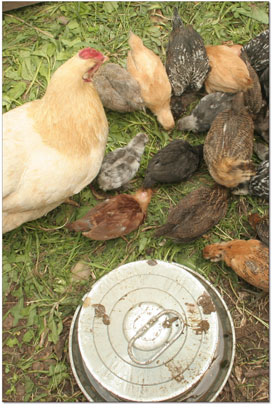| ||
Across the road and back
by Chef Boy Ari Annabelle and Annabelle were my only two chickens left, the last of what was once a great flock of six chickens named Annabelle. They all were good old friends as well as good old hens. Then four of them got killed by a dog that got in the yard. After the dog attack, the two remaining girls seemed more prone to wandering, as if looking for their friends. Common fixtures in the back alley, the Annabelles were also known to frequent the rabbit hutch in the neighbor’s side yard, where stray bunny food could be found. But for all their explorations, the girls never strayed from our block, never crossed any roads. After they disappeared, however, I had to wonder. At wit’s end, I crossed the road and started knocking on doors. I met neighbors who until then I’d only waved at. Then I met a guy who’d seen the girls in his back yard the very afternoon they disappeared. This was confirmation that the chickens had indeed crossed the road. “They went that way,” he pointed. I searched that way and this, widening the circle ever farther from home – after all, if they’d crossed one road, who’s to say they didn’t cross more? I asked fence painters, skateboarders, stroller pushers, trampoline bouncers, and even a lady outside the spooky house on the corner. But I found no further clues. All I knew was that the girls had “crossed the road,” as it were, placing them in an unresolved superposition of states – both alive and dead until further notice. I could only hope the grass was as green on the other side. My lost girls aren’t the only chickens whose fates hang in the balance right now. In many American cities, including some very large ones, City Councils are considering ordinances to allow small flocks of well-behaved chickens within city limits. But for many good citizens, raising chickens remains illegal, which means that only outlaws will have chickens. For some, this is the only life we’ve ever known. For others, it’s a tough choice that must be made. Anyone who is serious about gardening and eating locally, or anyone who even has a compost pile, should consider raising chickens at home. Why toss your kitchen scraps on a stinky compost pile when your feathered friends would love to turn that stuff into manure and eggs? And if you turn them loose in a fenced portion of your yard that needs some cultivation, they will eat weeds, break up clods of dirt, and generally give the soil some TLC. If I find aphids or caterpillars on my garden, I give the infected leaves to the chickens. If I’ve had a hard day and I need someone to talk to late at night, I open the hen house and listen to their soft cooing, which is the next best thing to a lullaby. After my dear old hens disappeared, I placed an order for more day-old chicks. Four of my neighbors found out about my order and wanted to get in on it, and now our block is chock-a-block with chickens. While the outlaw lifestyle suits me fine, some of these neighbors have young families, and the stress must be crushing. For their sake, and for the sake of families who want chickens all over the world, I’m asking you all to write your elected officials in support of urban hens. I recently received a phone call from a reader who’d heard about my missing Annabelles through the grapevine. The caller said he knew of a boy who’d found some hens near my neighborhood and brought them home. One of the hens was attacked and killed by a skunk, but the other one was alive and lonely. I retrieved the last Annabelle and brought her home to the “Coop DeVille” – a movable combination hen house and chicken yard that I place in strategic locations around the back yard. Previously occupied for three years by the six Annabelles, and now inhabited by a neighborhood’s worth of 2-week-old chicks, we feared mayhem in the cramped coop. Would Annabelle use her pulpit atop the pecking order to institute population control, or would the Mama-hen impulse kick in? For a moment, both hen and chicks seemed wary, and miffed at the other’s presence. Annabelle gave a few pecks into the ground – an encouraging display of comfort. When she found something to eat, one of the baby chicks rushed her, jumped at her face, and snatched the food out of her mouth. Hopelessly outnumbered, it seemed that Annabelle had been nominated as the mother hen. Every morning Annabelle is jumping up and down as if to say, “Help! They’re driving me nuts! Let me outta here!” So I do, into the newly secured back yard. She spends her days rolling in the dust in the bike shed, or scratching for grain that I dump in strategic locations – like at the base of fruit trees (while hunting for grain, she drops little “presents”). Annabelle and the cat follow each other around the yard, taking turns chasing one another. In time, the chicks will inevitably need mentoring about life’s “hen-ly” matters, laying eggs and stuff, and I’ve no doubt that Annabelle will play the mama hen. She’ll pass the torch of age-old wisdom that she returned from across the road to deliver. •
|
In this week's issue...
- December 18, 2025
- Let it snow
Although ski areas across the West have taken a hit, there’s still hope
- December 18, 2025
- Look, but don't take
Lessons in pottery theft – and remorse – from SW Colorado
- December 11, 2025
- Big plans
Whole Foods, 270 apartments could be coming to Durango Mall parcel


